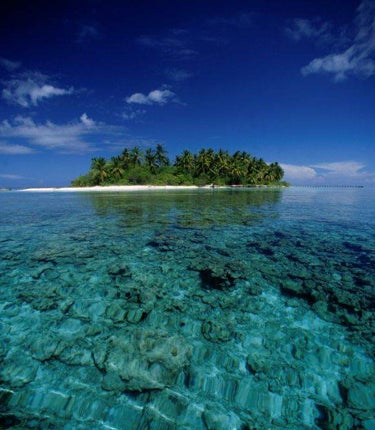Mind the water hazard...floating golf course to be built in Maldives
Cutting-edge development in pipeline as islands plan for effects of climate change

The island nation of the Maldives, confronted by rising oceans and a landscape that is just a few feet above sea level, is poised to build a floating golf course and convention centre in what could be the first of a series of futuristic off-shore developments designed to confront the threat of global warming.
The country’s government has signed an agreement with a Dutch firm to investigate the feasibility of developing a number of facilities that would be located among the 26 main atolls. It is likely the company, Dutch Docklands, will also look into the possibility of building floating homes. It has previously built floating islands in Dubai.
“The methods and procedures developed by the company for floating developments reduce the impact on underwater life, and minimise the changes to coastal morphology,” said a statement issued by the office of President Mohamed Nasheed.
Since coming to office in late 2008, Mr Nasheed, a former political prisoner, has been quick to prioritise climate change as one of the most pressing threats to his nation, which is made up of a total of 1,200 islands. Once of his first announcements after defeating former dictator Maumoon Abdul Gayoom was a plan to try to buy and alternative homeland – possibly in Sri Lanka or India – because of the threat to his nation, more than 80 per cent of which is no more than a metre above sea level.
Parts of the capital, Male, are protected by a three-metre-high defensive wall that cost more than £30m and took a full 14 years to build. The UN has forecast that the oceans are likely to rise by up to 60cm by 2100.
In the aftermath of the Asian tsunami, up to 40 per cent of the Maldives was left lying under water. One hundred people died and the impact of the massive wave spurred the authorities to think about relocating people from the lowest-lying islands to those that are slightly higher. In Kandholhudhoo, a densely populated island in the north of the country, about 60 per cent of residents have already volunteered to evacuate within the next 15 years. The government wishes to see a total of 60 per cent of its inhabitants relocated to higher islands.
Ahead of last year’s Copenhagen summit, the president drew attention to the fate of the Maldives by holding an underwater cabinet meeting at which he and his minister used scuba equipment. Mr Nasheed has also announced plans to turn the Maldives in a carbon-neutral nation within 10 years. As it transpired, no agreement was reached in Copenhagen, to the bitter disappointment of the Maldives president and many other leaders of smaller nations.
“We’re now actually trying to send our message, let the world know what is happening, and what will happen to the Maldives if climate change is not checked,” he said at the time. “If the Maldives cannot be saved today we do not feel that there is much of a chance for the rest of the world.”
Dutch Docklands, which was involved in developing some of the man-made islands that make up The World resort in Dubai, describes itself as “the global leader in floating developments, concepts and infrastructure”. Its website adds: “Our Intellectual Property is based on hundreds of years of experience in the battle against water in the Netherlands.”
Join our commenting forum
Join thought-provoking conversations, follow other Independent readers and see their replies
Comments